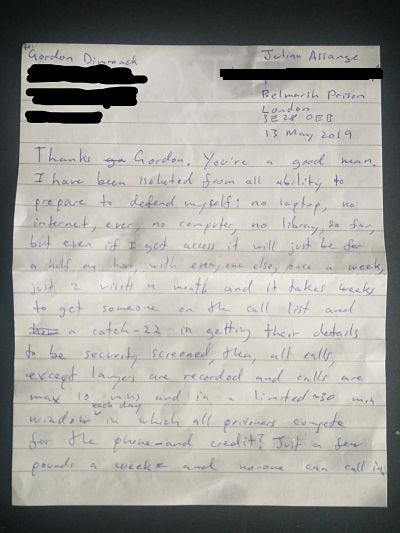
WikiLeaks founder was arrested on 11 Apr 2019 at the Ecuadorian embassy in London, where he was granted refuge since 2012. He has been in Belmarsh prison serving 50 weeks skipping bail. The UN working group on arbitrary detention said it was a “disproportionate sentence” for what it described as a “minor violation”.
While in jail, Assange has written letters to independent journalist Gordon Dimmack, who was among many to write to Assange over recent weeks.
The Canary has obtained the copies of some of those handwritten letters, and has published it on its web site.
According to The Canary, other supporters of Assange have recently confirmed that their letters have reached him. It is nonetheless difficult to fully authenticate the letter given Assange’s current predicament in a high-security prison. The Canary has been informed that Dimmack is not the only person to have received a response, and that the hand-writing bears a likeness to that of Assange. The letter reads;
“The other side? A superpower that has been preparing for 9 years, with hundreds of people and untold millions spent on the case. I am defenseless and am counting on you and others of good character to save my life. I am unbroken, albeit literally surrounded by murderers, but, the days where I could read and speak and organize to defend myself, my ideals, and my people are over until I am free! Everyone else must take my place. The US government, or rather, those regrettable elements in it that hate truth, liberty and justice, want to cheat their way into my extradition and death, rather than letting the public hear the truth, for which I have won the highest awards in journalism and have been nominated 7 times for the Nobel Peace Prize. Truth, ultimately, is all we have.”
 Assange is not just fighting for freedom now, but his health. And the “worst attack on press freedom in our lifetime” requires the greatest fightback, reported The Canary.
Assange is not just fighting for freedom now, but his health. And the “worst attack on press freedom in our lifetime” requires the greatest fightback, reported The Canary.
Executive director of the Reporters Committee for Freedom of the Press (RCFP) Bruce Brown, meanwhile, said:
“Any government use of the Espionage Act to criminalize the receipt and publication of classified information poses a dire threat to journalists seeking to publish such information in the public interest, irrespective of the Justice Department’s assertion that Assange is not a journalist.”
One cannot escape the perverted sense of justice running through this case. Assange exposed state crimes which, almost a decade later, are now being levelled against him by the same actors. The man who revealed the horrors of Guantánamo is now holed up in the UK’s equivalent; the man who released video evidence of the US army’s criminal killings of journalists now finds the US has put a target on his own head. Assange’s journalistic record of exposing state crimes is acutely connected to the slow-motion physical and mental devastation imposed on him, reported The Canary.
WikiLeaks editor-in-chief Kristinn Hrafnsson added:
“Julian’s case is of major historic significance. It will be remembered as the worst attack on press freedom in our lifetime.”




